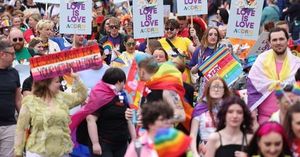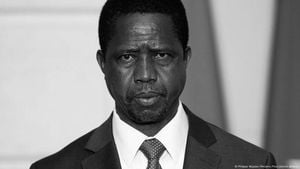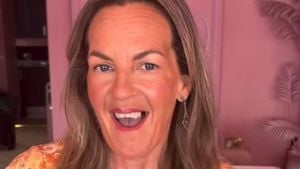BBC Three's new drama series What It Feels Like For A Girl offers a raw, unfiltered glimpse into the tumultuous teenage years of Byron, a working-class youth navigating identity, danger, and desire in early 2000s Nottingham. Adapted from transgender writer Paris Lees’s 2021 memoir, the eight-episode series pulls no punches, blending harrowing realities with surreal, often electrifying storytelling that challenges viewers to confront uncomfortable truths about gender, abuse, and survival.
Less than 20 minutes into the first episode, audiences are thrust into a surreal dream ballet depicting a teenager performing sex work in a grim public lavatory for crumpled fivers. This bold opening signals the show’s fearless approach, which includes more explicit scenes than even the risqué HBO series The White Lotus. The series doesn’t shy away from the darker side of Byron’s youth—underage sex work, statutory rape, armed robbery, and prison time—all before the character has even sat A-level exams.
Paris Lees, who uses she/her pronouns today but is portrayed in the show during her youth as Byron (they/them), grew up in Hucknall, a small town near Nottingham, and the series faithfully captures the gritty atmosphere of the turn-of-the-millennium Midlands. From dingy clubs to rundown flats, the recreation is so authentic it evokes a wave of nostalgia for anyone who remembers the era of Nokia phones and Zombie Nation’s dance anthems.
Ellis Howard’s portrayal of Byron is a revelation. His performance captures the fragile vulnerability of a teenager caught between the desire to escape and the harsh realities of his environment. Byron’s journey is complicated by a cast of vivid characters, including the Fallen Divas—a queer group of misfits who live by the motto “be gay, do crimes.” Among them are Sasha, played with catty flair by Hannah Jones, and Lady Die, a podium-dancing sexpot by night who code-switches to a masculine persona when necessary, portrayed by Laquarn Lewis.
The series also explores the toxic masculinity embodied by Byron’s father, Steve, played by Michael Socha, who believes that blasting his son with harshness will “make him a man.” Meanwhile, Jake Dunn’s Liam is a volatile small-time criminal who oscillates between offering ketamine and threatening violence, underscoring the perilous world Byron inhabits.
What sets What It Feels Like For A Girl apart is its willingness to play with form and tone. The show features a cottaging dance number, a hilarious chip shop scene where trans girls discuss the finer points of anatomy, and an unnerving nightmare sequence that morphs a robbery into an erotic, surreal experience. These moments of stylistic daring add layers to the narrative, making it as compelling as it is unsettling.
Yet, the series is not without controversy. While it is a landmark depiction of a working-class trans woman’s experience, some critics argue that it glosses over the complexities and darker aspects of Paris Lees’s past. Lees, who was convicted of robbery with violence at 18 for an attack on an elderly man and served time in prison, began identifying as a trans woman while incarcerated. The BBC’s promotion of Lees and the series has sparked debate about the broadcaster’s stance on transgender issues, especially amid a cultural backdrop where LGBTQ+ rights are increasingly contested.
Maya Forstater of the campaign group Sex Matters criticized the show’s portrayal of Byron’s journey, arguing, “Presenting the idea of an effeminate boy ‘becoming a girl’ as an edgy coming-of-age story is presenting delusion as self-discovery. This series will promote a regressive, dangerous, impossible and fundamentally homophobic dream to another generation of gay young men.”
Further complicating the discourse is the BBC’s handling of pronouns in the series. The episode guide uses they/them for Byron before transition and she/her afterward, reflecting Lees’s own evolving identity. However, some viewers question the decision to cast Ellis Howard, a cisgender male actor, to play the role of Byron, arguing it misses an opportunity to cast a transgender actor.
The series arrives at a time of heightened debate over gender identity in the UK. The Supreme Court’s recent ruling affirming biological sex as real has polarized public opinion and cultural institutions alike. Former BBC journalist Cath Leng revealed that in 2013, Paris Lees was part of a meeting with BBC executives that led to the broadcaster adopting self-identification for pronouns, a policy some now view as controversial.
Despite the debates, What It Feels Like For A Girl remains a powerful piece of television. It captures the messy, painful, and often joyous journey of a young person grappling with identity, survival, and belonging. The show’s unflinching portrayal of predatory men, from corrupt police officers to street criminals, paints a harrowing picture of the dangers faced by marginalized youth.
Critics have noted that while the series is gripping, it sometimes drags, with a pacing that makes it difficult to discern whether days or weeks have passed between scenes. The costuming, particularly of the Fallen Divas, veers towards a stylized, almost glossy Y2K aesthetic, occasionally at odds with the grittier narrative. Still, the visual feast of neon-lit clubs and grimy flats keeps viewers hooked.
At its core, the show is about more than just transition. It’s about a girlhood lived on the edge, marked by resilience and rebellion. Ellis Howard’s Byron is a character you root for even as you fear for their safety. The series dares to explore the intersection of queerness, class, and trauma with a rare honesty.
What It Feels Like For A Girl premiered on June 3, 2025, on BBC Three and is available on iPlayer. It’s a must-watch for those interested in bold, boundary-pushing storytelling that captures the complexity of growing up different in a world that often refuses to understand.




